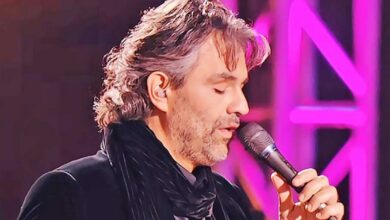Exhausted, He Performed Iconic Tunes One Final Time
Johnny Cash’s iconic phrase, “Hello, I’m Johnny Cash,” has become synonymous with his legacy as a country music legend. This simple greeting, delivered with his deep, resonant voice, opened the door to countless performances, including the unforgettable rendition of “Folsom Prison Blues” that first captivated audiences in 1955. As the man in black graced the stage, he captured not only the spirit of country music but also the hearts of many with his profound storytelling and emotional authenticity.
However, the context surrounding his last public performance on July 5, 2003, is particularly poignant. By then, Cash was grappling with severe health challenges, including a diagnosis of Shy–Drager syndrome, which impacted his autonomic nervous system, leading to significant physical difficulties. Navigating life in a wheelchair, experiencing facial paralysis, and struggling with compromised lung capacity due to pneumonia, Cash’s health had deteriorated dramatically. Despite these obstacles, his passion for music persisted, demonstrating his resilience and love for his craft.
In a heartbreaking twist, June Carter Cash, his wife and musical partner of nearly four decades, passed away on May 15, 2003. Her absence weighed heavily on him, especially during what would be his final concert just two months later. June was not only a personal partner but also a vital artistic collaborator, with their musical synergy resulting in numerous hits, including the Grammy-winning “Jackson.” Their love story, intertwined with a shared dedication to music, shaped their artistic identities and profoundly affected Cash’s life.
The Carter Family Fold in Hiltons, Virginia, hosted Cash’s last performance. This venue was steeped in musical heritage, serving as a tribute to the Carter family’s lasting influence on American folk and country music. June Carter Cash was the daughter of Maybelle Carter, a central figure in the original Carter Family, which laid the groundwork for country music. The fold, part museum and part concert venue, symbolizes the rich legacy of the Carter family and is set against the breathtaking backdrop of Clinch Mountain, further accentuating its significance for Cash.
Rewind to the mid-20th century, and one can see the rise of Johnny and June’s musical partnership through songs that resonated with fans. Their 1967 duet “Jackson,” a playful yet poignant tale of love and defiance, became a defining piece of their collaboration. The song’s narrative captured the spirit of two individuals portraying the complexities of their relationship while showcasing their undeniable chemistry. The couple’s marriage on March 1, 1968, culminated in a partnership that would yield numerous successful live performances and recordings, leaving an indelible mark on the country music landscape.
Cash’s final performance at The Carter Family Fold was emotional. Despite suffering from laryngitis, he took to the stage with an unyielding spirit that reflected a lifetime dedicated to musical expression. Those present that night witnessed not just a concert but a heartfelt tribute to his legacy and a poignant farewell to June. The performance highlighted his resilience, as he continued to captivate his audience even in the face of personal and health struggles.
In the opening moments of the concert, John Carter Cash, his son, provided support to his ailing father. John Carter has carried on the family tradition, becoming a musician and producer himself, instrumental in preserving the Cash family legacy. His presence on stage was both a reminder of Johnny’s enduring impact and a symbol of the continuity of their musical heritage. Unfortunately, Johnny would pass away just a few months later, on September 12, 2003, marking the end of an era.
Johnny Cash’s music transcended genres and generations, speaking to the human experience in profound ways. His unique blend of country, rock ‘n’ roll, blues, and folk resonated with audiences far and wide. Cash’s honesty and stark portrayal of life’s struggles made his songs relatable, while his deep baritone voice added a layer of gravitas that few artists could match. Songs like “Ring of Fire,” “I Walk the Line,” and “Hurt” continue to resonate and influence new artists, ensuring that his legacy is far from forgotten.
Throughout his career, Cash was not just a performer; he was a storyteller, painting vivid portraits of love, loss, and redemption. His ability to connect with audiences went beyond mere entertainment, allowing listeners to find solace in the shared experiences reflected in his music. His work explored themes of faith, despair, and societal issues, earning him respect and admiration from both fans and critics alike.
In his final years, Cash’s collaboration with Rick Rubin revitalized his career, leading to critically acclaimed albums that introduced his music to a new generation. Their partnership on American Recordings highlighted not only the strength of Cash’s songwriting but also his versatility as an artist. Songs like “The Man Comes Around” showcased his ability to evolve while remaining true to his roots, offering a contemporary take on timeless themes.
As we remember Johnny Cash, it’s essential to acknowledge the emotional resonance of his music and the profound impact he had on American culture. His songs live on, a testament to a life spent in pursuit of artistic expression and heartfelt connection to every listener. Though he may have left this world, Johnny Cash remains not only a symbol of country music but an enduring part of the fabric of American history, a figure whose legacy will resonate for generations to come.





